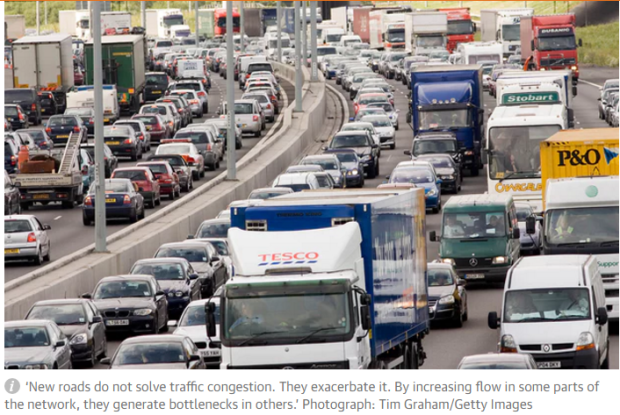
From The Guardian. 1 August 2017
But to contest this peculiar form of insanity is, as I know to my cost, to be widely declared insane. Look at how advertising is dominated by car companies, and you begin to understand the drive to ensure that this counter-ergonomic system persists. Look at the lobbying power of the motor industry and its support in the media, and you see why successive plans to address pollution seemed designed to fail.
The government’s new pollution plan notes that its actions will be limited, as “we must maintain discipline on public spending”. Yet it sustains what the Department for Transport boasts is the “biggest upgrade to roads in a generation”. Launched in 2014, at the height of David Cameron’s austerity programme, this plan promised to “triple levels of spending by the end of the decade”, with £15bn for 100 new road schemes.
New roads do not solve traffic congestion. They exacerbate it. By increasing flow in some parts of the network, they generate bottlenecks in others. Governments then seek to bypass the bottleneck, creating a worse one further along the system. It doesn’t matter how often and how powerfully the induction of traffic by roads is demonstrated (the first findings were published in 1937); the programme persists.
No holistic solution to the multiple problems caused by this planned chaos can be contemplated, as efficiency would be injurious to special interests. Success is measured by miles travelled, rather than needs met. It’s like measuring the health of the population by the weight of medicines it consumes.
* Article continues here – https://amp.theguardian.com/commentisfree/2017/aug/01/car-chokehold-britain-polluted-inefficient-transport-system-motor-industry
# # #
About the author: @georgemonbiot
 George Monbiot is the author of the bestselling books Feral: rewilding the land, sea and human life, The Age of Consent: A Manifesto for a New World Order and Captive State: The Corporate Takeover of Britain, as well as the investigative travel books Poisoned Arrows, Amazon Watershed and No Man’s Land. His latest book is How Did We Get into This Mess? Politics, Equality, Nature. His latest project is Breaking the Spell of Loneliness, a concept album written with the musician Ewan McLennan
George Monbiot is the author of the bestselling books Feral: rewilding the land, sea and human life, The Age of Consent: A Manifesto for a New World Order and Captive State: The Corporate Takeover of Britain, as well as the investigative travel books Poisoned Arrows, Amazon Watershed and No Man’s Land. His latest book is How Did We Get into This Mess? Politics, Equality, Nature. His latest project is Breaking the Spell of Loneliness, a concept album written with the musician Ewan McLennan
# # #
About the editor: @ericbritton
Eric Britton
13, rue Pasteur. Courbevoie 92400 France
Bio: Founding editor of World Streets (1988), Eric Britton is an American political scientist, teacher, occasional consultant, and sustainability activist who has observed, learned, taught and worked on missions and advisory assignments on all continents. In the autumn of 2019, he committed his remaining life work to the challenges of aggressively countering climate change and specifically greenhouse gas emissions emanating from the mobility sector. He is not worried about running out of work. Further background and updates: @ericbritton | http://bit.ly/2Ti8LsX | #fekbritton | https://twitter.com/ericbritton | and | https://www.linkedin.com/in/ericbritton/ Contact: climate@newmobility.org) | +336 508 80787 (Also WhatApp) | Skype: newmobility.)
